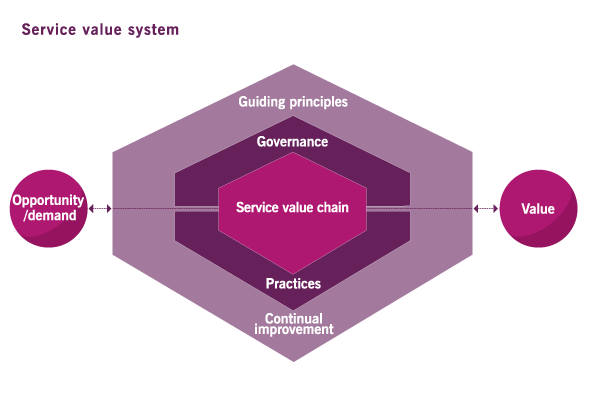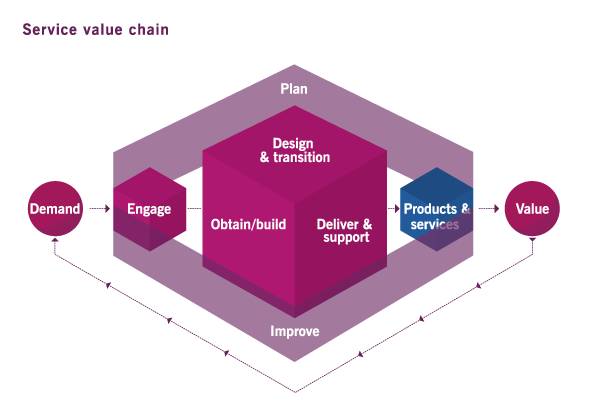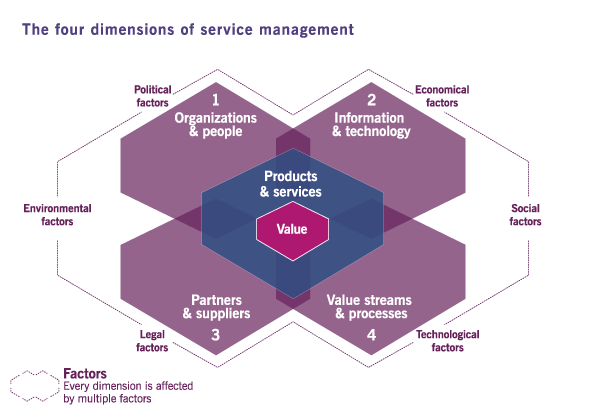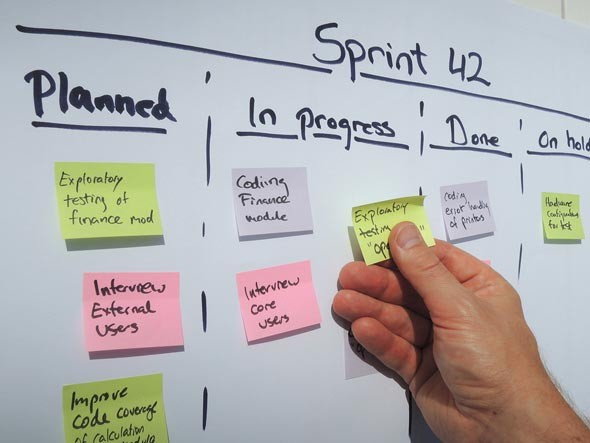 Copyright © AXELOS Limited 2022. Used under permission of AXELOS Limited. All rights reserved.
Copyright © AXELOS Limited 2022. Used under permission of AXELOS Limited. All rights reserved.ITIL has evolved beyond the delivery of services to providing end-to-end value delivery. The focus is now on the co-creation of value through service relationships.
The updated framework will focus on facilitating value co-creation via a service value system (SVS). The SVS represents how different components and activities can work together, in any type of organization, to facilitate value creation through IT enabled services.
In ITIL 4, customers are an essential element in the process of creating value.
Incorporated within the SVS is the service value chain (SVC). The service value chain is the set of interconnected activities that, when sequenced in the right way, provides an operating model for the creation, delivery, and continual improvement of services. The service value chain allows an organization to define a number of variants of these sequences known as value streams, of which the v3 service lifecycle is one such example.
The service value chain is flexible and can be adapted to multiple approaches, including product-focused delivery teams, DevOps, and centralized IT.
The adaptability of the value chain enables organizations to react to changing demands from their stakeholders in the most effective and efficient ways.
 Copyright © AXELOS Limited 2022. Used under permission of AXELOS Limited. All rights reserved.
Copyright © AXELOS Limited 2022. Used under permission of AXELOS Limited. All rights reserved.The ITIL guiding principles, first introduced in ITIL Practitioner, are at the core of ITIL 4.
The guiding principles help IT professionals to adopt and adapt ITIL guidance to their own specific needs and circumstances. These guiding principles can (and should) be followed at every stage of service delivery. They allow professionals to define approaches and navigate difficult decisions.
All apply to both service management and to the services being managed across the whole organization.
The guiding principles provide a comprehensive and holistic vision of how a service (as well as a service management) organization should manage and execute its work. The focus on collaboration, automation, and keeping things simple, reflects principles found in Agile, DevOps and Lean methodologies.
What is currently known in ITIL v3 as “processes” are being expanded to consider other elements such as culture, technology, information and data management, and more. This holistic vision of a way of working is known as a “practice” in ITIL 4, and forms a fundamental part of the ITIL 4 framework.
The ITIL practices described in ITIL 4 will maintain the value and importance provided by the current ITIL processes, whilst at the same time expand to be integrated to different areas of service management and IT, from demand to value. The ITIL 4 framework will reinforce a flexible and non-siloed approach for the application of ITIL practices.
 Copyright © AXELOS Limited 2022. Used under permission of AXELOS Limited. All rights reserved.
Copyright © AXELOS Limited 2022. Used under permission of AXELOS Limited. All rights reserved.To support a holistic approach to service management, ITIL also defines four dimensions that collectively are critical to the effective and efficient facilitation of value for customers and other stakeholders in the form of products and services.
The four dimensions represent perspectives which are relevant to the whole service value system.
ITIL 4 will reflect other frameworks and integrate new ways of working including Agile, DevOps, Lean, IT governance and leadership. The guiding principles draw from proven ways of working and foster a customer centric culture of collaboration, working holistically and gaining continual feedback. ITIL 4 will provide the flexibility needed to adopt and adapt what is relevant to each business and organizations while reinforcing the fundamentals for delivering quality IT service.
All of this sets ITIL and service management in a strategic context, bringing together ITSM, Development, Operations, business relationships and governance in a holistic approach. This is a truly integrated model for digital service management.
The ITIL 4 framework also includes governance activities that enable organizations to continually align their operations with the strategic direction set by the governing body.
ITIL 4 provides organizations with a simple and practical improvement model to maintain their resilience and agility in a constantly changing environment.
You can find details of the ITIL4 Qualification Scheme here: ITIL®4 Qualification Scheme.

Further information on ITIL4 can be found on the following pages:
ITIL® Foundation | £1,225View Details |
ITIL® Specialist - Create, Deliver & Support | £1,575View Details |
ITIL® Specialist - Drive Stakeholder Value | £1,575View Details |
ITIL® Specialist - High Velocity IT | £1,575View Details |
ITIL® Strategist - Direct, Plan & Improve | £1,575View Details |
ITIL®4 Leader - Digital & IT Strategy | £1,675View Details |
IT Service Management in the Digital Age (Virtual) | FreeView Details |
ITIL® Specialist: Acquiring & Managing Cloud Services | £1,095View Details |
ITIL® Specialist: Sustainability in Digital & IT | £1,675View Details |
ITIL® Specialist: Business Relationship Management | £1,575View Details |
ITIL® Specialist: IT Asset Management | £1,575View Details |
ITIL® Combined Practitioner: Monitor, Support and Fulfil | £1,575View Details |
ITIL® Practitioner: Service Desk | £595View Details |
ITIL® Practitioner: Incident Management | £595View Details |
ITIL® Practitioner: Service Request Management | £595View Details |
ITIL® Practitioner: Problem Management | £595View Details |
ITIL® Practitioner: Monitoring and Event Management | £595View Details |
ITIL® Combined Practitioner: Plan, Implement & Control | £1,575View Details |
ITIL® Practitioner: IT Asset Management | £595View Details |
ITIL® Practitioner: Service Configuration Management | £595View Details |
ITIL® Practitioner: Release Management | £595View Details |
ITIL® Practitioner: Deployment Management | £595View Details |
ITIL® Practitioner: Change Enablement | £595View Details |
ITIL® Combined Practitioner: Collaborate, Assure & Improve | £1,575View Details |
ITIL® Practitioner: Relationship Management | £595View Details |
ITIL® Practitioner: Service Level Management | £595View Details |
ITIL® Practitioner: Supplier Management | £595View Details |
ITIL® Practitioner: Information Security Management | £595View Details |
ITIL® Practitioner: Continual Improvement | £595View Details |